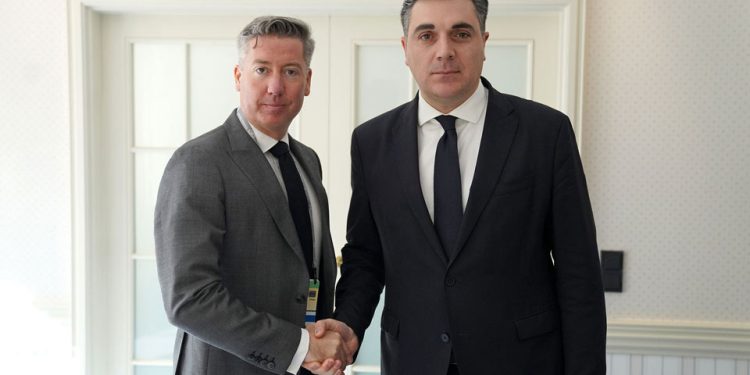The Georgian Minister of Foreign Affairs, Ilia Darchiashvili, met with the Vice-Chairman and CEO of the Munich Security Conference, Benedikt Franke.
During the meeting, Minister Darchiashvili expressed gratitude for the conference being organized at a high level.
The meeting highlighted the successful and longstanding cooperation between the Munich Conference and the Georgian government. The discussion also focused on future collaboration.
“Minister Darchiashvili emphasized the importance of presenting Georgia properly within the Munich Conference, an effective international forum addressing global political challenges.
“The conversation touched on the 2024 report of the conference, with the Georgian side noting that the report relies on information from politically motivated individuals,” the Georgian Foreign Ministry stated.
Both parties agreed to collaborate closely in the future within the international conference to disseminate objective information about Georgia.
The Vice-Chairman of the Munich Conference expressed interest in further cooperation with the Georgian government, including the planning of joint events to help strengthen the positive image of Georgia.
For the record, in the latest edition of the Munich Security Report for the year 2024 titled “Lose-Lose?”, Bidzina Ivanishvili, described as “the pro-Russian oligarch and founder of Georgia’s governing party,” is identified as responsible for Georgia’s recent democratic backsliding and movement away from the European Union, “against the wishes of the majority of the Georgian public.”
Apart from the role of Ivanishvili, the report also highlights Russia’s tactic of using threats of “fueling separatism in Abkhazia and South Ossetia [occupied Tskhinvali region] to sow instability.” The report reads that “Russia may have failed to draw Georgia, Moldova, and the Western Balkans into its camp, but it still seeks to spoil their westward integration.”
According to the report, following the Russian invasion of Ukraine, the cooperative era of European security has ended, and countries stuck in the grey zone between the Russian and Western camps find themselves in a precarious situation, forced to choose sides, noting that Georgia, Moldova, and the Western Balkans are feeling “the precariousness of being in between the camps.”
The report states that it is in the hands of the EU and NATO to “shrink the grey zone” by actively supporting countries on their paths toward membership while also setting more ambitious milestones along the way.
It calls on the EU to concretize the notion of staged accession and reward reform progress with gradual access to its institutions and policies. This should include, according to the report, “regular invitations of candidate countries as guests to European Council and Council meetings.” Moreover, “NATO Allies should, where necessary, extend bilateral security guarantees in the interim phase until accession,” the report states.
The Munich Security Report provides an annual summary and interpretation of significant global developments. Offering insights into pivotal challenges, it sets the stage for discussions at the conference in Munich. This year marks its tenth edition.
Related stories:
Georgia’s European integration goals highlighted at Munich Conference
President Zurabishvili: For us, enlargement of the EU is an existential issue














